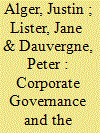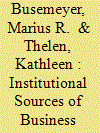| Srl | Item |
| 1 |
ID:
184647


|
|
|
|
|
| Summary/Abstract |
A handful of companies dominate the world’s shipping industry. These firms have gained political leverage over the global governance of container shipping in particular. Intriguingly, in recent years the Danish conglomerate Maersk—the world’s biggest container and shipping vessel company since the mid-1990s—has been using its influence to push for higher environmental standards for the industry as a whole. To some extent these initiatives are helping to promote environmental efficiencies, cleaner fuels, and greener technology. But they are also raising costs for small and midsized companies with extremely low profit margins, further enhancing the competitiveness of the biggest shipping conglomerates in an increasingly oligopolistic market. While voluntary self-governance by companies such as Maersk is incrementally improving the environmental management of global shipping, it is also further concentrating governance power within a few transnational corporations, potentially taking more ambitious regulation off the agenda.
|
|
|
|
|
|
|
|
|
|
|
|
|
|
|
|
| 2 |
ID:
097817


|
|
|
| 3 |
ID:
173638


|
|
|
|
|
| Summary/Abstract |
Recent years have seen a revival of debates about the role of business and the sources of business power in postindustrial political economies. Scholarly accounts commonly distinguish between structural sources of business power, connected to its privileged position in capitalist economies, and instrumental sources, related to direct forms of lobbying by business actors. The authors argue that this distinction overlooks an important third source of business power, which they conceptualize as institutional business power. Institutional business power results when state actors delegate public functions to private business actors. Over time, through policy feedback and lock-in effects, institutional business power contributes to an asymmetrical dependence of the state on the continued commitment of private business actors. This article elaborates the theoretical argument behind this claim, providing empirical examples of growing institutional business power in education in Germany, Sweden, and the United States.
|
|
|
|
|
|
|
|
|
|
|
|
|
|
|
|